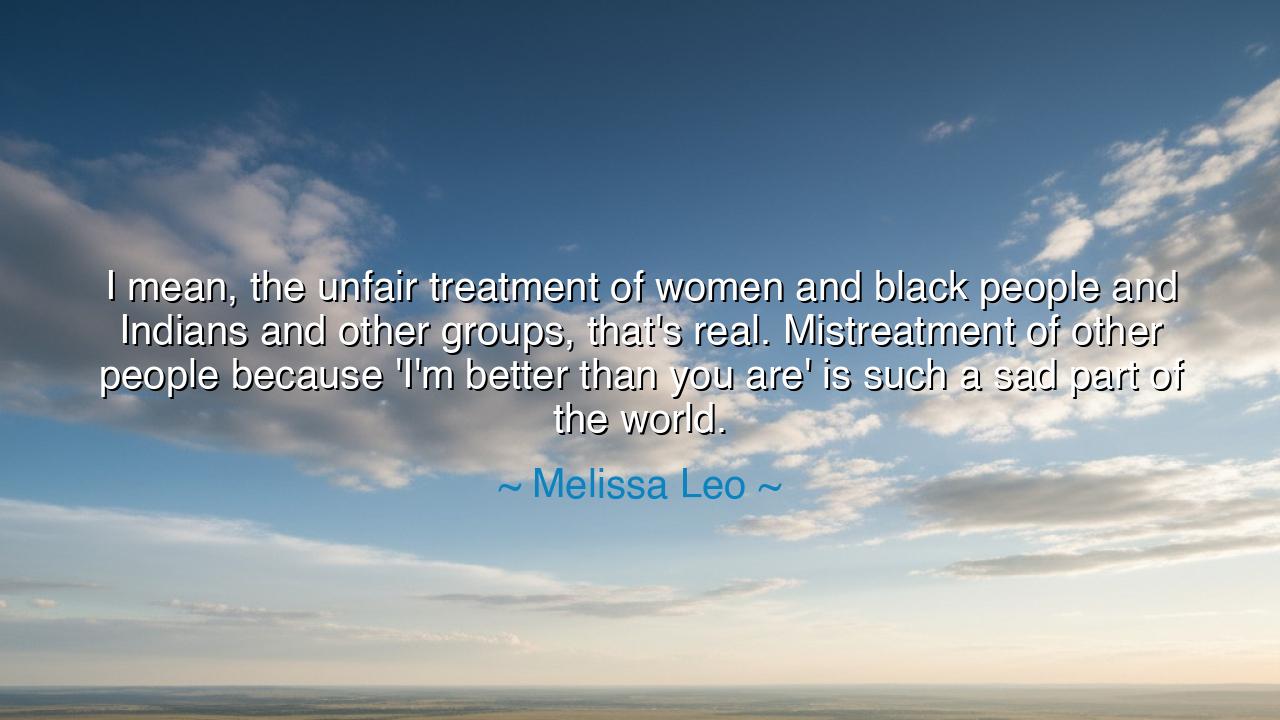
I mean, the unfair treatment of women and black people and
I mean, the unfair treatment of women and black people and Indians and other groups, that's real. Mistreatment of other people because 'I'm better than you are' is such a sad part of the world.






Hear the words of Melissa Leo, spoken with clarity and sorrow: “I mean, the unfair treatment of women and black people and Indians and other groups, that’s real. Mistreatment of other people because ‘I’m better than you are’ is such a sad part of the world.” In this reflection, she reveals a wound that is ancient and enduring—the arrogance of one group claiming superiority over another, and the suffering born of that false claim.
The heart of her words lies in the recognition that inequality is not illusion but real. For centuries, those in power have sought to maintain their place by declaring others less worthy—less human, less intelligent, less deserving of dignity. From the chains of slavery to the silencing of women’s voices, from the displacement of Indigenous peoples to the countless discriminations that echo into our present, this is the sad part of the world: that cruelty arises not from necessity but from pride, from the poisonous belief of “I am better than you.”
The ancients saw this same failing. In Athens, the birthplace of democracy, not all were free. Women were confined, slaves were property, foreigners were lesser. Even in Rome, where law and order were exalted, entire peoples were conquered and reduced to chattel, while the rulers congratulated themselves on their superiority. Yet the philosophers—Socrates, Epictetus, Marcus Aurelius—whispered against this arrogance, reminding humanity that virtue, not birth or station, determines worth. Leo’s lament belongs to this lineage of truth-tellers who pierce the illusion of superiority.
History offers us stories that make her words vivid. Think of the Civil Rights Movement in America, when African Americans stood against centuries of degradation. The marches in Selma, the voice of Martin Luther King Jr., the courage of Rosa Parks—these were the cries against that sad belief of superiority. Or consider the suffragettes, who fought for the simple truth that women, too, deserved the right to vote and shape society. They were mocked, imprisoned, beaten—yet they stood, for they knew that equality was not a gift but a birthright.
What makes the mistreatment most grievous is that it is unnecessary. The earth has resources enough, the human heart has compassion enough, the mind has creativity enough for all to flourish together. Yet pride blinds, and fear distorts, until some seek to elevate themselves by pushing others down. This is the disease of superiority: it destroys both the oppressed and the oppressor, for in denying another’s humanity, one loses one’s own.
The lesson for us is eternal: reject the poison of “I am better.” See every human being as kin, as bearer of the same breath of life. Confront injustice wherever it rises, whether in institutions or in the small cruelties of daily life. Do not turn away from those who suffer under the weight of prejudice. Instead, lift them, stand beside them, learn from them. In this practice lies the antidote to the sadness Leo names.
So let Melissa Leo’s words be carried forward as wisdom: that the unfair treatment of any group is not merely an offense to them, but to humanity itself. If you would live as a just soul, refuse the path of arrogance and superiority. Choose instead the path of dignity, compassion, and solidarity. For only when we see one another not as “better” or “worse,” but as equals in worth, will the sad part of the world begin to fade, and a brighter chapter of human history be written.






AAdministratorAdministrator
Welcome, honored guests. Please leave a comment, we will respond soon